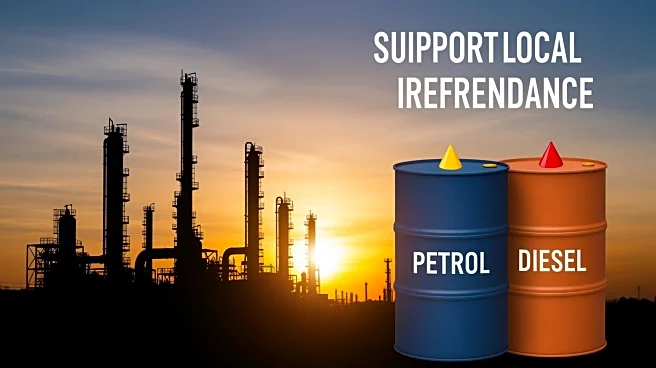What's Happening?
The Manufacturers Association of Nigeria (MAN) has expressed support for the Nigerian Federal Government's recent decision to impose a 15% import tariff on petrol and diesel. This policy is seen as a strategic
move to promote local content development and reduce reliance on imported refined petroleum products. MAN's Director General, Segun Ajayi-Kadir, emphasized that the tariff aligns with the 'Nigeria First' agenda, aiming to accelerate energy sovereignty and industrial competitiveness. The association advocates for transparent implementation to ensure benefits reach both industry and consumers, while preventing excessive pricing and anti-competitive behavior. MAN also calls for reinvestment of tariff proceeds into energy infrastructure and support schemes for industries, including incentives for small and medium manufacturers reliant on diesel generators.
Why It's Important?
The introduction of a 15% import tariff on petrol and diesel is significant for Nigeria's economic landscape, as it aims to strengthen domestic refining capacity and conserve foreign exchange. By encouraging local refining, the policy could stabilize fuel supply, reduce import dependency, and foster industrial growth. This move is expected to create employment opportunities, enhance technical expertise, and promote local content development. Additionally, it could attract investment in modular and conventional refineries, boosting competition and ensuring long-term energy security. The policy aligns with Nigeria's broader industrialization objectives, potentially improving the macroeconomic environment and supporting the stability of the Naira.
What's Next?
The Manufacturers Association of Nigeria urges the government to ensure a stable transition period, supporting local refiners to prevent supply shocks and speculative hoarding, especially during festive periods. MAN advocates for continuous engagement among stakeholders in the energy sector to maintain market stability and policy coherence. The association also calls for the full privatization of government-owned refineries to stop financial losses and enhance functionality. As the policy unfolds, targeted incentives for small and medium manufacturers and investment in energy infrastructure are expected to play crucial roles in achieving the desired outcomes.
Beyond the Headlines
The policy's emphasis on local content development and industrial sustainability could lead to long-term shifts in Nigeria's energy and manufacturing sectors. By reducing foreign exchange expenditure on imports, the policy may contribute to a more favorable macroeconomic environment, encouraging further investment in domestic industries. The focus on energy independence and industrial growth aligns with Nigeria's broader economic transformation goals, potentially reshaping the country's industrial landscape and enhancing its global competitiveness.









